#milsiril dunmeshi
Text

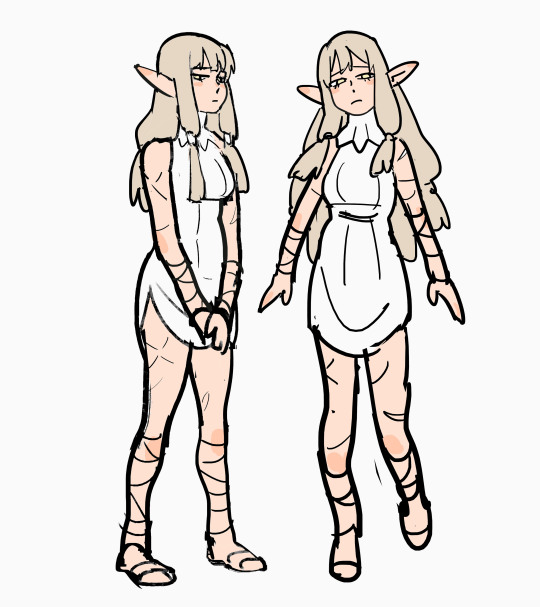

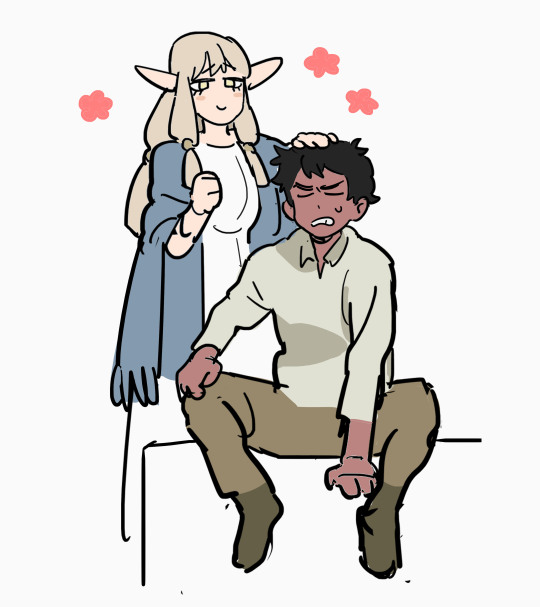
mama Milsiril
#dunmeshi#kabru having a doting mom was cute ok#dont rb with milsiril hate like dont u think i know shes got issues#almost everyone in the series is racist anyway#dungeon meshi#milsiril#milsiril dunmeshi#myart#dani art#delicious in dungeon
1K notes
·
View notes
Text
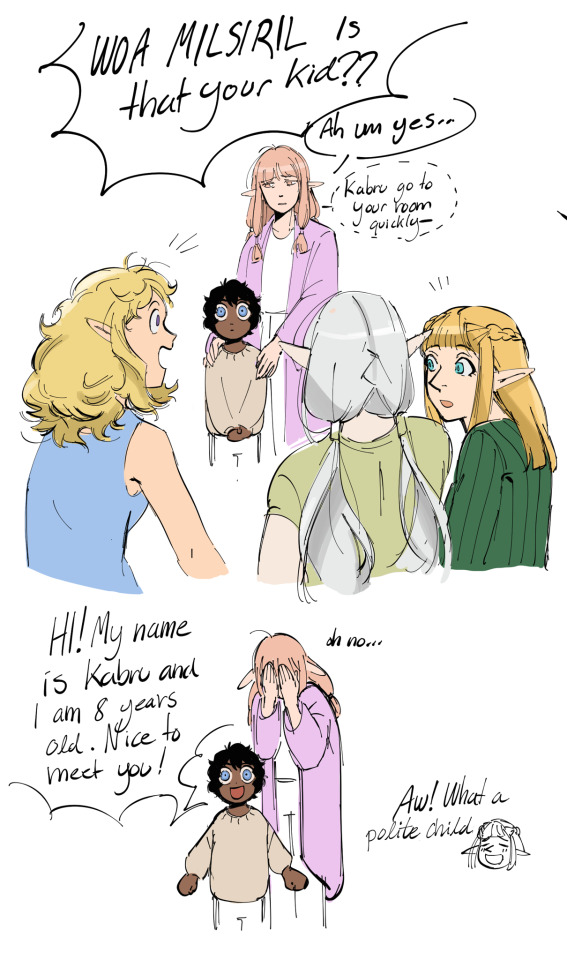
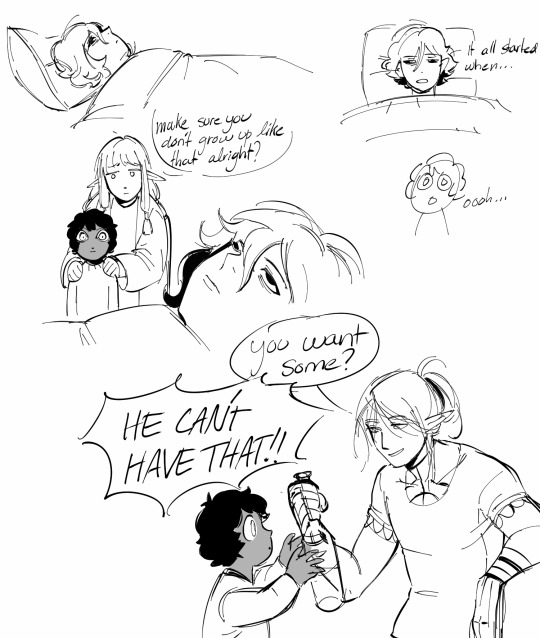
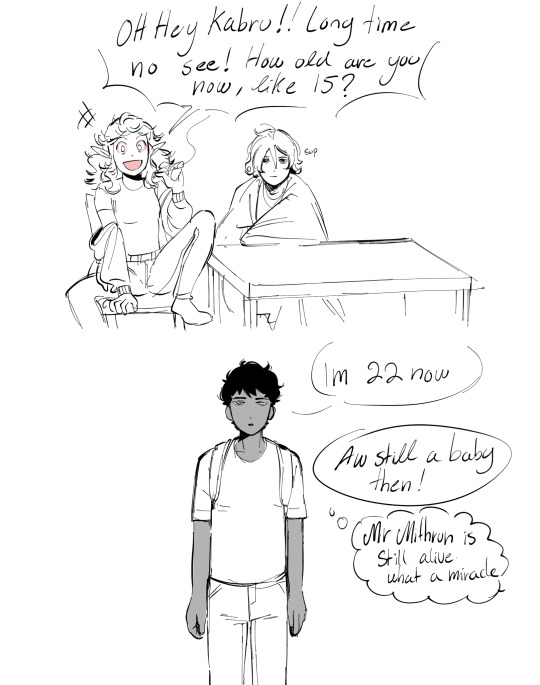
Mom's weird "friends"
#dungeon meshi#kabru#mithrun#fleki dungeon meshi#fleki#lycion#lycion dungeon meshi#pattadol#mithrun dungeon meshi#dunmeshi#milsiril
5K notes
·
View notes
Text
kabru dunmeshi is basically a chernobyl survivor who was adopted by an eternally young hot white woman who was going to pamper him for his entire life but instead of wanting to be pampered he was like "mom, i need to become a stalker. i need to return to the Zone" and his elf mom was like "nooo the Zone sucks you'll be shot by a bandit" and he was like "no mom i need to go to the Zone and find out what happened" and she was like "fine" and pulled out a machinegun from her days in the Suicide Squad and trained him to kill while firing on him with live ammunition. Then he went to the Zone and immediately got killed by a pack of wild dogs because elf mom only taught him how to shoot other humans
#dungeon meshi#dungeon meshi spoilers#dunmeshi#dunmeshi spoilers#delicious in dungeon#delicious in dungeon spoilers#kabru#milsiril#stalker: shadows of chernobyl
4K notes
·
View notes
Text
kabru/mithrun is so funny because imagine being milsiril and hearing that your beautiful baby boy is not only coming home after risking his life in a dungeon against your wishes but bringing his boyfriend to meet you
then they walk in and it’s your most hated ex-coworker who you backed out of mercy killing because he was too pathetic
#pls i know milsiril/mithrun is more complicated than that it’s just a joke#dungeon meshi spoilers#dungeon meshi manga spoilers#dunmeshi#dungeon meshi#dunmeshi spoilers#kabru of utaya#mithrun#kabrumisu#milsiril
433 notes
·
View notes
Text
I think it’s so interesting that Kui decided to show us how differences in lifespan affect tallmen and elf relationships from both angles with Kabru and Thistle and also how that reflects real-life abusive situations. And then goes on to deconstruct that by showing how genuine understanding and respect CAN exist between the races with other characters!
Kabru being raised by an elf (who is shown to only have a superficial respect for short-lived races, the same one might have for a pet in a lot of ways) and treated like a child even though he’s in his 20s. After all, a 20 year old elf would be a kindergartener, and Milsiril seems to have a rather toxic combination of overprotectiveness and dehumanizing tendencies that leads to perpetually seeing the children she raises as children, even well into adulthood for their race.
And yet, we see with characters like Otta that this doesn’t have to be true of EVERY elf (nor should it logically be, especially those who spend actual time around short-lived races.) For all the jokes made at her expense I actually think it’s really interesting that she’s also canonically queer since recognizing the agency and maturity of short-lived races is in itself a type of queerness in elf society from what we’ve seen. Senshi too, as funny as his misconstruing Chilchuck as a child is I think it’s really important that he realizes his mistake and rethinks his assumptions on short-lived races following his example. It doesn’t HAVE to be the way it is, but it will take work on each side to improve things.
Then on Thistle’s end… woof. Complete opposite of Kabru, it was difficult for the tallmen of the golden kingdom to comprehend how someone in their, like, 60s could still behave like a teenager and chalked that up to a personal and moral failing rather than literal differences in biology (kind of an autistic mood but that’s a conversation for later.) It’s just as disturbing as Milsiril’s treatment of the children she adopts really, since they explicitly didn’t want an adult that could exert their own agency and control over their situation. And the thing is it’s not like that’s totally uncalled for, the previous points show how a non-insignificant number of members of long-lived races do genuinely see short-lived races as inferior, or are otherwise ignorant, like with below.
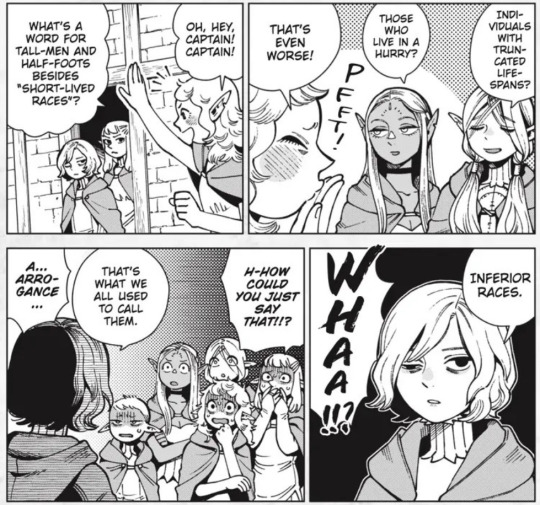
It ended up working out just how they wanted, because Thistle’s child-like innocence and singleminded desire to make the only family he had happy meant he was never going to do anything he didn’t think would help them… which then backfired, because of course it would. It’s overcontrolling and manipulative parenting, but with the added spice of lifespan differences and magic. Kabru ended up detesting the elves that raised him and wanting nothing to do with them, and Thistle basically had a massive breakdown trying too hard to please everyone. Infantilization vs adultification, as some have said, with predictable results.
#polly speaks#dungeon meshi#dungeon meshi spoilers#dunmeshi#delicious in dungeon#kabru of utaya#thistle dungeon meshi#child abuse tw#to be safe#ask to tag#sorry for the milsiril hate I’m willing to hear perspectives but everything about her icks me out#dungeon meta
310 notes
·
View notes
Text
Kabru, impossible mutual understanding & unknowable objects
Despite his concerted and constant efforts to understand other people, it’s established in a few extras that Kabru believes that true mutual understanding between certain different races is impossible. Specifically, between long-lived and short-lived races, and between humans and demi-humans. Partially, we can trace this conviction back to specific hang-ups caused by his life; the trauma of the Utaya disaster, prejudices he carries from his childhood, and his experience of racism among the elves. In this “little” essay, I’m gonna discuss how I think those experiences formed this belief, how it comes out in his actions, and how some of his actions seem to contradict it. The question of whether it’s possible to reach mutual understanding with other living beings despite our differences is one of the core themes of the manga, and I’ll also touch on how this aspect of Kabru’s character links to that.
Seeking understanding
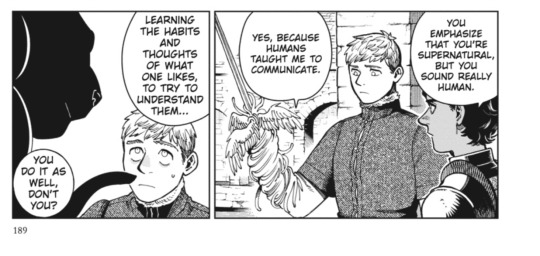
Kabru is a character who devotes a huge amount of time and effort to understanding people, and he is very good at it. In his internal monologue, we can tell how advanced and complex his skills of analysis are. He is able to read a huge amount of information just from looking at people's faces and body language.


People are, to him, what monsters are to Laios. This is something that's been expanded on at length in other, excellent meta. It's the fact that they're foils; it's the fact that Kabru is also very easy to read as autistic, with a special interest which is the opposite and parallel of Laios'. It's something that came out of trauma and alienation, as Laios' special interest in monsters also began as a coping mechanism.
The complicated origin of this "love" for monsters and for people comes through, I think, in the fact that one of the places we see both characters use their fixation is in being very, very good at killing the thing that they love. This also ties into the idea that loving something isn't even remotely mutually exclusive with using it to sustain your own survival; using it for your own purposes; hurting it or killing it. Love can be, and often is, violent, possessive and consumptive. This understanding is part of what makes Kui's depiction of interpersonal relationships so compelling to me.
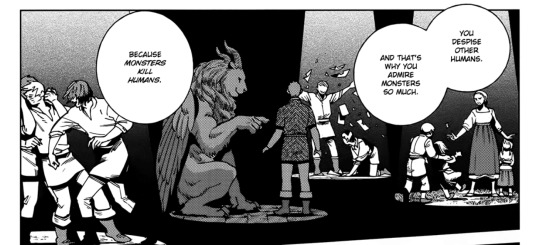
While Laios fixated on monsters and animals to seek a place of escape, in both his imagination and his self-image, from the humans who he couldn't understand and who couldn't understand him, Kabru seems to have fixated on understanding people in order to navigate the complex, socially marginal places that he has been forced into throughout his life. As an illegitimate child raised by a single mother with an appearance that marked him out as different to the point his father's family wanted to kill him, and a tallman child raised among elves who didn't treat him as fully human and wanted him to perform gratefulness for that treatment – treatment that, after he met Rin at age 9, he certainly always understood could be a lot worse – his ability to work out what people wanted from him, whether they were friendly or hostile or had ulterior motives, wasn’t just an interest. It will have been an essential skill.
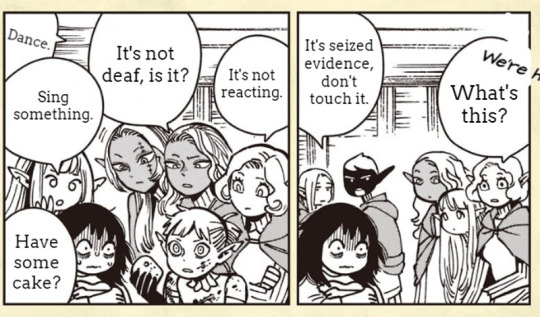
Milsiril, I think, was a flawed parent who tried to do her best by Kabru and did a lot of harm to him despite her best intentions. She may have treated him much better than an average elf would have, but like Otta and Marcille's mother, there are other elves with different outlooks on short-lived races. How would they judge her treatment of him? We don’t have any insight on what it could be, but to be honest, the person’s whose opinion of her I’d be most interested in knowing is Rin’s.
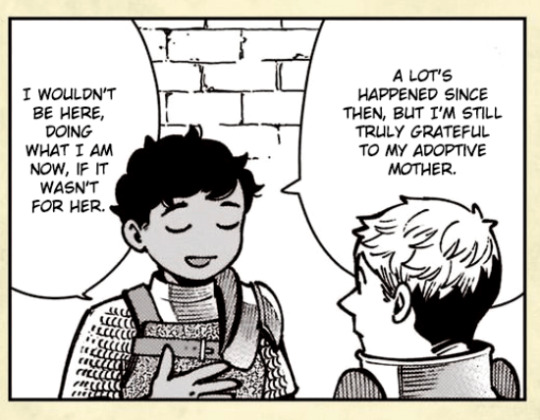
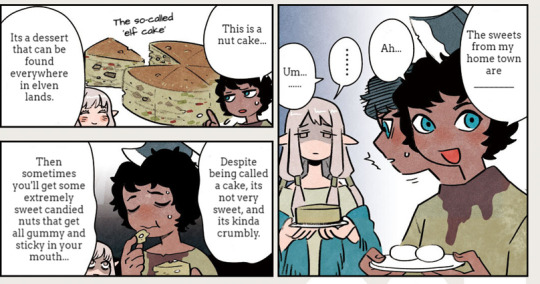
But even if she'd been perfect, living as an trans-racial adoptee in a deeply hierarchical nation with a queen who is a 'staunch traditionalist' who wouldn't even acknowledge the existence of a half-elf like Marcille (according to Cithis) is an experience that would deeply impact anyone.
Elves & Impossible mutual understanding
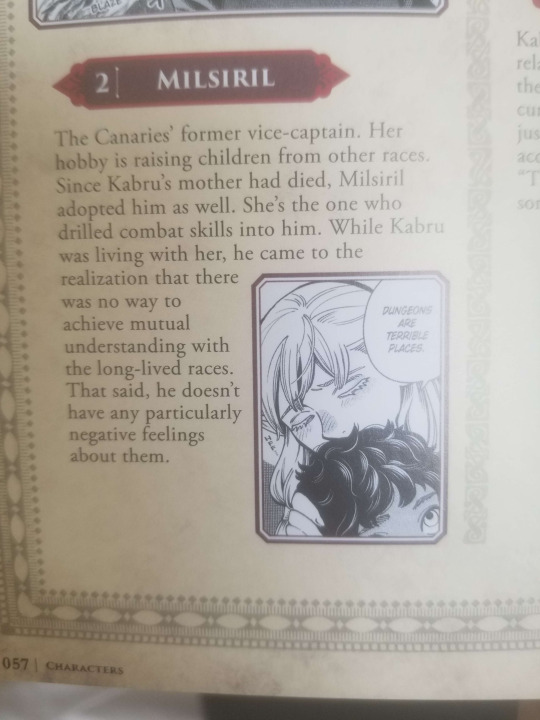
While Kabru was living with Milsiril - in other words, while living in the Northern Central Continent - he came to believe that "there was no way to achieve mutual understanding with the long-lived races."
This is evident in his political project: he wants short-lived races to have ownership over the dungeon's secrets. Despite his dislike of the Lord of the Island, he's a useful bulwark to stop the elves taking over. Despite his doubts about Laios, Laios needs to be the one to defeat the dungeon, because if he doesn't the elves will take over.
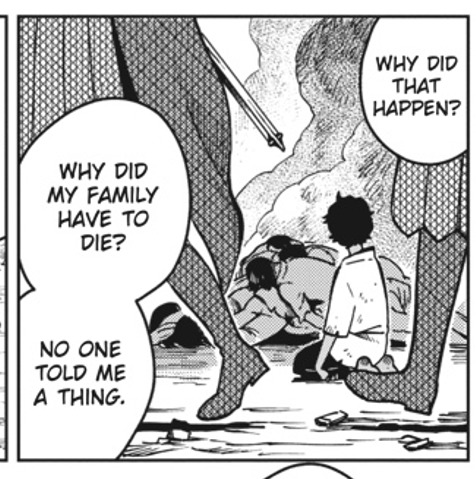
Kabru still carries a deep scar from Utaya, one that was exacerbated by the fact that he never got an answer to any of his questions about what happened or why. This, despite the fact that Milsiril knows about the demon and how it works. Do you think Kabru, with his social perceptiveness that borders on the superhuman, wasn't aware that she knew more than she would tell him?
Given that, the fact that he gets to a place where he "doesn't have any particularly negative feelings about [elves/long-lived species]" .... well, to put it bluntly, I believe that he thinks that's the case, but I kind of doubt it. After all, if he did have resentment, of Milsiril (someone who was his primary provider and caretaker since age six, and who despite her flaws, loves him and who I do think he loves) or of elves (who he has had to play nice with for most of his life, in order to survive, and will still have to play nice with in order to achieve his goals, since they hold all the power) what would that do except hurt him and make his life harder? Kabru is Mr. Pragmatic, so I don't think he'd let himself acknowledge any such feelings he did have. Exactly because he can't acknowledge them, they're well placed to get internalised as beliefs about the Fundamental Unchangeable Nature of the World.
However, these stated beliefs seem to contradict his actions. Despite his belief in the impossibility of forming a mutual understanding, he certainly seems to try to understand long-lived people, just as much as he does short-lived people. There's no noticeable difference between his treatment of Daya & Holm versus Mickbell & Rin that isn't clearly down to their relationship with him. His skills of human analysis were honed and developed while living amongst elves, and as soon as he's alone with Mithrun he immediately sets to understanding him - his interests, his motivations, his needs, and his past.
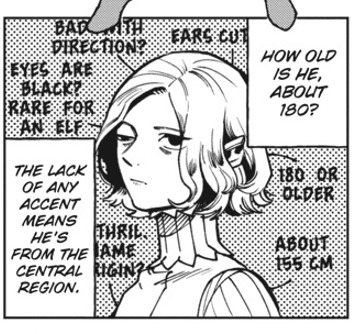
He treats him considerately and without bias, and despite the fact that Mithrun conquering the dungeon for the elves is both a reenactment of a core part of his childhood trauma and a political disaster for his aims, that doesn't seem to colour his perspective on Mithrun negatively at all.
This is something I find extremely laudable about Kabru, and it's another way he parallels Laios. He seems to understand that people, as a rule, (in Laios' case, he understands this about monsters - and eventually, all living beings) will act in their own interests, and if those interests conflict with yours, might harm you. But that's just their nature, and it's not something that should be held against them; you're also doing the same thing, after all. The crux of Laios' arc is precisely that he has to accept the responsibility of hurting someone else in order to achieve what he wants.
Kabru is deeply concerned with his own morals, what he should and shouldn't do, but mostly in the context of responsibility for the consequences - a responsibility he takes onto himself. He isn't scrupulous about what he needs to do in order to create the outcome he wants, but if he fails to create that outcome, then....
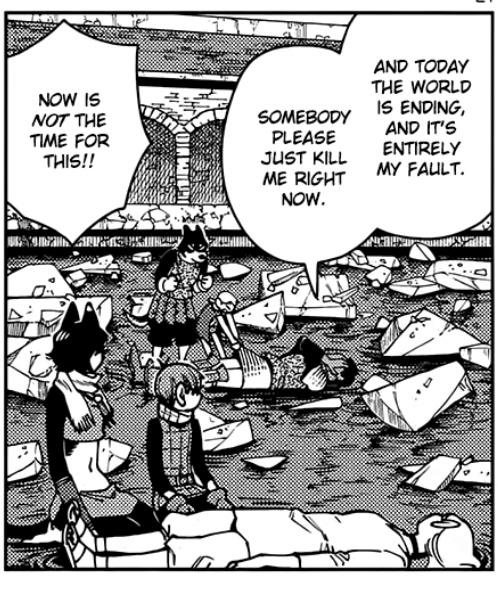
He blames himself to the point of thinking he should die. He doesn't blame Laios, or seem at all angry with him, despite concluding he should have killed him to prevent this outcome. That's because in his eyes, ultimately Laios was going to act according to his own nature, and it's Kabru's fault for not understanding that nature well enough. He's extremely confident in his ability to understand and predict others, (including elves and other long-lived people). Then, where does his conviction that mutual understanding is impossible come from?
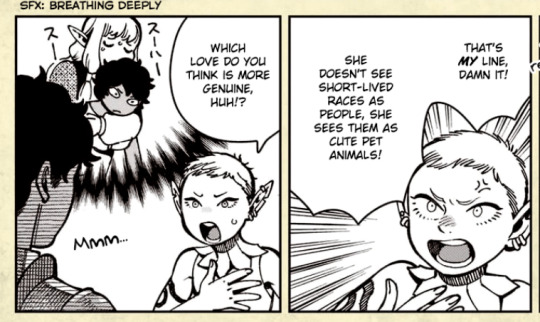
Partially, it's the "mutual" part. I'm sure Kabru, who isn't able or willing to deny Otta's insinuation that Milsiril saw him more like a pet than a son, has felt that his full interiority, the depth of his feelings and his ability to grow, act, and think as a fully equal being, was something that the elves around him just couldn't grasp. Because that was their excuse for it, he came to understand this as a gulf between short-lived and long-lived beings, an inevitable difference in outlook caused by their different lifespans.
This experience might be part of what leads to his iconic “fake” behaviour. He trusts his ability to understand others, but if they aren’t able to understand him, then there isn’t any benefit to being honest about his feelings and thoughts. If his attempts to reach mutual understanding with his caretakers were never able to be fulfilled, then it isn’t any wonder that he reacts with such surprise and horror at blurting out his desire to be Laios’ friend.
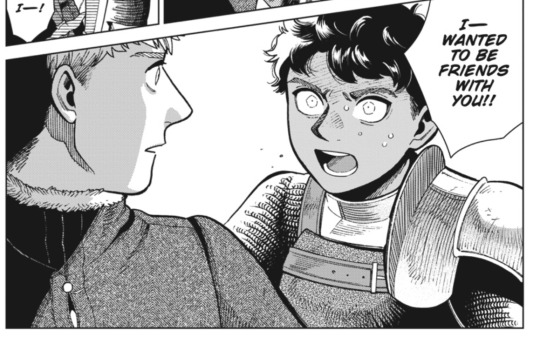
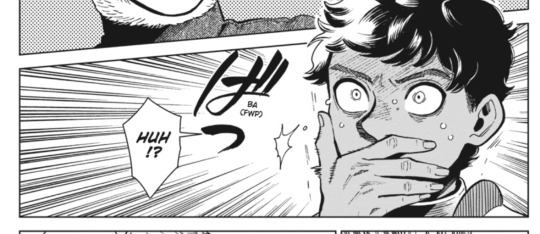
In his experience, making yourself vulnerable in that way only leads to being hurt. Soothing him, hushing him, lying to him, talking to him like a child that isn’t able to use proper judgement – that’s an inadequate and deeply hurtful way to respond to genuine distress, the desire for autonomy, or disagreement. Ultimately, I think that’s why he comes out on the side of being grateful to Milsiril; because she did equip him with the skills and knowledge he’d need to reach his goal, and let him go.
Though he could understand them, they couldn't understand him. To the extent that was true - which I'm sure it was - it wasn't due to anything about lifespan. It was due to the elves’ racism, and the solipsitic mindset & prejudiced attitude that it caused them to approach him with.
Because, if it needs to be said, the idea that there is an unbreachable gap in understanding between the long-lived and short-lived species is not true. Marcille and Laios have a much greater difference in lifespan than any full elf from any short-lived person, and they’re able to understand each other – maybe not perfectly, but better than many other people who are closer in life-span to them.
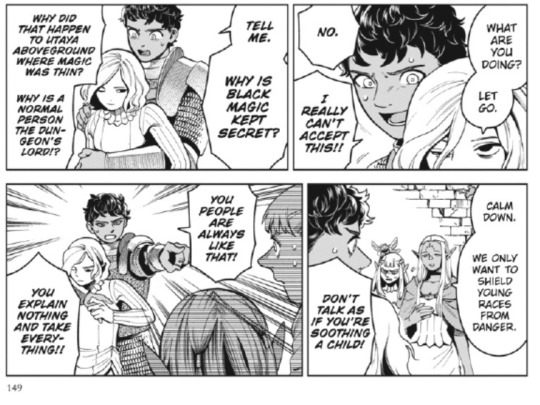
That doesn’t mean that I think Kabru is wrong about this, however. Because there’s an interpretation of his statement that is reflected in his actions and is true. When he talks about his problem with elves, it’s not just their attitudes: it’s their power, and what they use it to do. They “explain nothing and take everything”. Though it’s presented in the guise of ‘guiding and protecting’, in fact it’s a simple case of a powerful nation using their military power, wealth, access to resources, and historically stolen land – including the island itself – to protect their own interests and advance their own agenda. That’s why they’d be able to show up, seize the dungeon, and forcibly take Kabru’s party and Laios’ party to the West. If Kabru wants to stop that from happening, or change that status quo, persuasion or a bid to be understood would be completely pointless. Between the political blocs formed by long-lived species and the interests of short-lived species, “mutual understanding”, given their current, unequal terms, would be impossible. This is something that we see reflected in Kabru’s actions; before he asks his questions about the dungeon, he grabs Mithrun as leverage. He never really attempts to persuade the canaries to see his point of view, because that would be pointless: they’re agents of the Northern Central Continent’s monarchy, and will act in its interests regardless of any individual relationship with him.
I don’t think Kabru sees the different dimensions of this belief of his in quite such clear terms, however, as is evidenced by the other group who he thinks it’s impossible to communicate with.
Demi-Humans & Unknowable Objects
The other place that we see his conviction about the impossibility of mutual understanding is in the kobold extra.
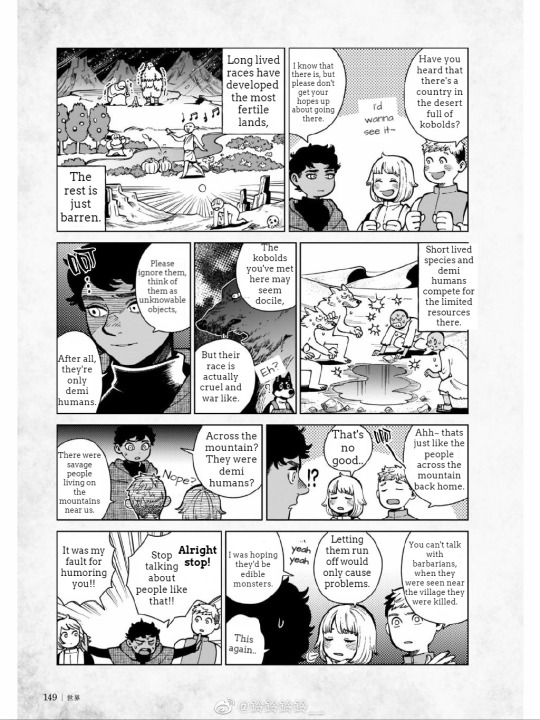
I'm including the whole thing, because I think it's an excellent and clever piece of world-building. Aside from what it says about Kabru, which I'll expand on shortly, what this extra does is deconstruct and call into question the usual "fantasy ontological biology" present in these sort of DnD-like settings. Essentially, the kind of worldbuilding where a race (such as kobolds) can be described as war-like, and that's establishing something essential about their biological nature. That's common to the point that if Kui didn't include this, some people would probably come away thinking that's the case about, e.g., the orcs.
But here, despite what Kabru is saying, the information the reader actually gets is:
the conflict between short-lived humans and demi-humans such as kobolds is mostly over access to material resources that they need to survive.
These resources are scarce because powerful nations, such as the elves, have monopolised them.
Kabru, who has grown up in a place at the centre of these conflicts, ascribes essential, negative traits to a cultural group which was in direct conflict with his own. Communication with this other group is impossible; they aren't people, they're more like objects.
oh yes! just like this conflict between groups of tall-men, a conflict which the reader will immediately interpret as more clearly analogous to real-life racism. Our other protagonists also carry prejudices from growing up in a place where a marginalised group was in conflict with the dominant group over scarce resources. It's definitely impossible to communicate with these people, and you can only kill them.
Woah, when you say it like that, it sounds pretty bad!
But also, nobody walks away having had a realisation or unlearned their prejudices - because they don't have the tools they need to do that work. Yet. I do think, to an extent, it could happen - especially with Kabru, since it's suggested in the epilogue that Melini might become a safe-haven for demi-humans.

To focus in on Kabru, the key here is his statement that you should think of demi-humans as "unknowable objects". Even his extraordinary powers of understanding have seemingly hit a limit. Part of this is just inherited prejudice, and doesn't need to have a complicated psychological explanation, any more than the elves who were prejudiced against him need one.
But also... this is probably somewhat linked to the way demi-humans seem to be considered "pseudo-monsters". They're the place that the strict delineation between the human and the monstrous is permeated. Laios, who is not interested in humans, remembers and is excited by Kuro. Chilchuck and Laios argue over whether it's OK to eat a mermaid. Kabru's prepared to (pretend to) roll with the idea that Laios ate the orcs.
But these are people, aren't they? Of course, this is a social construction, as we see from the fact that in the Eastern Archipelago, the label of "human" is reserved for tallmen, but in most of the rest of the world it depends on some obviously arbirary classification based on number of bones; "demi-humans" aren't in any essential way monstrous, except to an extent in their appearance, and physical location - due to their marginal social status, they're pushed out to live in unsafe places such as dungeons.
Therefore, Kabru's view of demi-humans as fundamentally "other", unable to be understood - monstrous - could be read as akin to abjection, the psychoanalytical concept described by Julia Kristeva. In order to create a bounded, secure superego, that thing which permeates and calls into question the border between self and other, human and animal, life and death, is rejected and pushed to the margin.
“Not me. Not that. But not nothing, either. A "something" that I do not recognize as a thing.[...] On the edge of nonexistence and hallucination, of a reality that, if I acknowledge it, annihilates me. There, abject and abjection are my safeguards. The primers of my culture.” (Kristeva et al., 1984, p. 11)
“It is thus not lack of cleanliness or health that causes abjection but what disturbs identity, system, order. ” (Kristeva et al., 1984, p. 13)
“The pure will be that which conforms to an established taxonomy; the impure, that which unsettles it, establishes intermixture and disorder. [...] the impure will be those that do not confine themselves to one element but point to admixture and confusion.” (Kristeva et al., 1984, p. 107) (discussing food prohibitions in Leviticus)
This is both (due to its affinity with food-loathing and disgust) a very fruitful concept to apply to dunmeshi, and a psychoanalytical theory which I wouldn't exactly cosign as True Facts About Human Psychological Development. You may also know the abject from its utilisation in the classic essay "Horror and the Monstrous-Feminine" by Barbara Creed - that's a lot more approachable than Kristeva if anyone's interested.
Key here, though, is that through the symbol of the "demi-human" is embodied a step between "human" and "monster" - and that's a prospect that puts at risk the whole notion of an absolute separation between those two categories in the first place. To Laios, that's something wonderful, and to Kabru, it's terrifying. We can see this principle further embodied in the relationship both characters have with the notion of becoming monstrous.
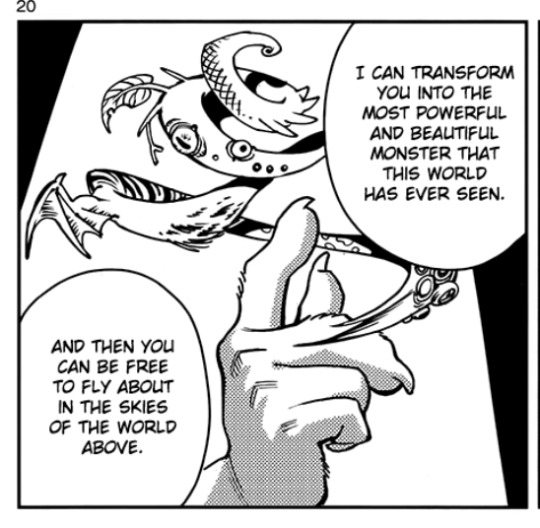
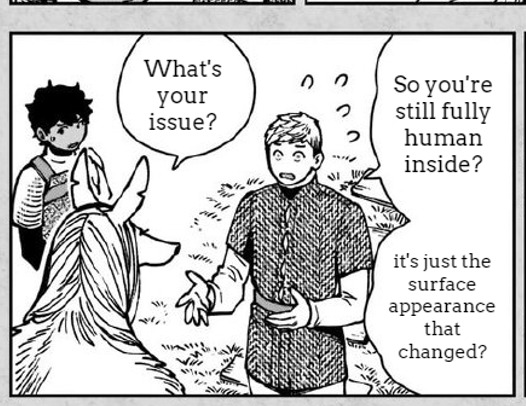
To Laios, this is transcendent, and represents a renunciation of everything human - in fact, if it didn't, it wouldn't "count".
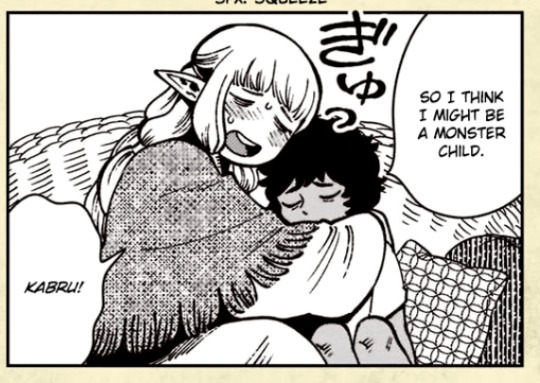
To Kabru, it's a deeply-held fear, established by his childhood alienation (due to his illegitimacy, his eyes, and perhaps also his neurodivergency), deepened by monster-related trauma and the sense of responsibility and survivors guilt he feels for what happened at Utaya. His identity as a human who is not monstrous is key to his sense of stability and safety; he doesn't want to touch monsters, he doesn't even want to see them.
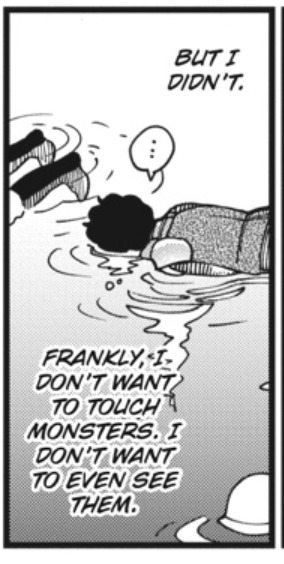
To acknowledge a kinship, a possibility of similarity between the things he loves (humans) and the things he hates (monsters) would be more than touching them - it would be putting them inside him. We know, quite explicitly, that this notion is triggering to Kabru. He literally has what seems to be a flashback when he's about to eat the harpy omelette.
So he abjects it, classifying the demi-human as fundamentally unlike him - an unknowable object, or an object that he refuses to know. Because in understanding it, he would interject the things he hates and fears into his self, which is already, always under threat by that hated and feared object.
Of course, again, Kabru isn't very good at enacting this refusal in practice. For one, when he chooses between his desires and ingesting the feared object, eating monsters... he eats monsters. Part of this is treating himself badly, the "ends justify the means" mentality. His goal is to destroy all monsters, so if he needs to become monster-like to do that, he will. But part of it is also the other motivation that he didn't even seem to know about until he said it: he wants to become Laios' friend, and to learn from him how a person can like monsters. He wants, at least in some part of him, to reconcile the feared and hated object into something he can understand.
For another:
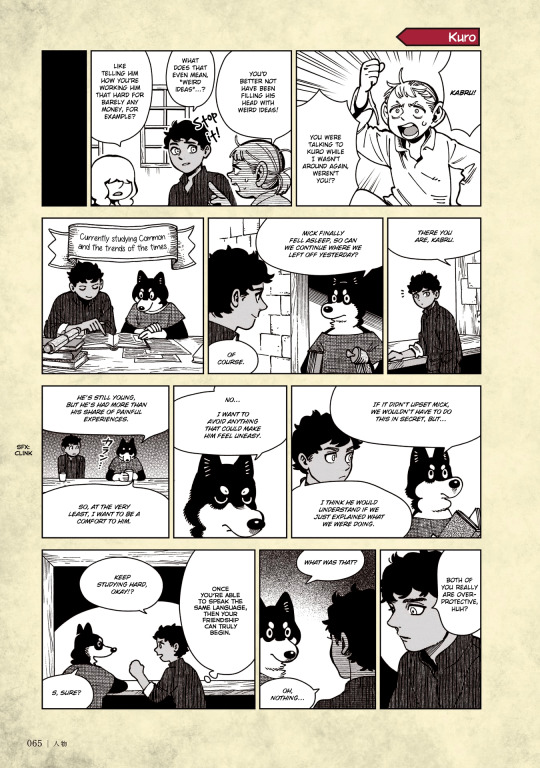
Kabru can speak the kobold language. In the first place, while this may have been common in Utaya, it also could have been something he chose to learn, an early expression of his interest in understanding and talking to all sorts of people. It isn't the kind of thing you learn if you believe that communication between yourself and the group that speak it is impossible, is it?
It's possible to harbour prejudices against a group while being kind to an individual, and given Kabru has those prejudices regardless of his reasons, that is what he is doing. But also, his treatment of Kuro doesn't reflect a sincerely held belief that he's an "unknowable object" at all. His approach is exactly the same as it is to any other person: an analysis of goal and motive, and an attempt to help if he's sympathetic and their goals align - going out of his way to give language and local knowledge lessons in secret. His conviction that Mickbell and Kuro will truly become friends when they can properly communicate is completely contradictory to any sense of demi-humans as fundamentally different, or impossible to reach mutual understanding with. To me, it seems like this self-protective shield against the corruptive force demi-humans as an idea present to his identity, this abjection, when Kabru is face-to-face with one, just simply can't hold up against his finely honed skill of intellectual empathy. Perhaps because he's autistic, it seems his "empathy" is less an emotional mirror response, and more a set of cognitive skills for analysis of others. That instinctual, emotional empathy might not trigger when presented with a member of an out-group, but if it’s possible for Kabru to turn his cognitive empathy off, we don’t see him do it.
This isn't to say that this prejudice doesn't affect his behaviour. For one, it could negatively impact his judgement of politics and policy, where individual people don't enter into it. For another, I'm not convinced he'd be willing to overlook Mickbell's exploitative relationship with Kuro if Kuro wasn't a kobold. As it is, since both of them are satisfied, he doesn't feel like he needs to intervene, regardless of the fact Mickbell isn't paying Kuro. But if Daya and Holm were in a relationship, and Holm took both Daya's and his own share from their ventures, but only compensated her in living expenses and kept the rest, do you think he'd tolerate it, for example? Even if she said it was OK?
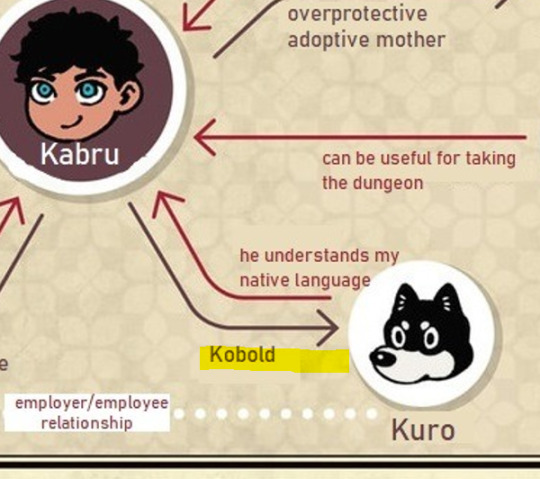
Conclusion

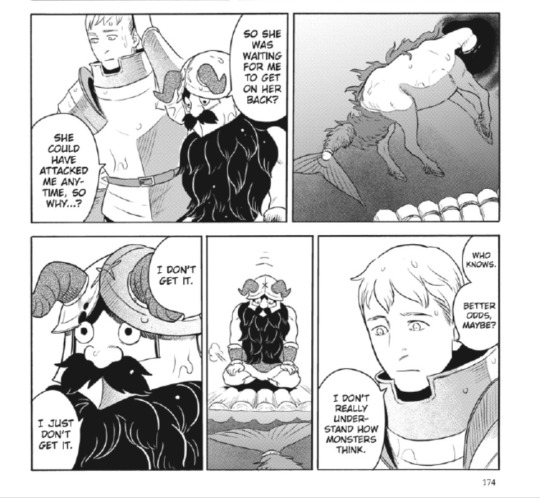
The kelpie chapter establishes that "people can never know what monsters are really thinking." That isn't just true of monsters, though.
True mutual understanding is impossible - between anyone. We can never truly understand another person's heart. This is touched on in, for example, the existence of shapeshifters and dopplegangers. Even a monster that seemed like a perfect copy of a person wouldn’t be that person, and wouldn’t be a satisfactory replacement.
We’re intended, I think, to understand the winged lion's repeated suggestions to just replace people who have been lost with copies as something uncanny, which demonstrates the way that the winged lion never manages to attain a complete understanding of humans. A version of a person who was created to fulfil your memories of them, to be the person who you wanted them to be, would be a terrible, miserable thing.
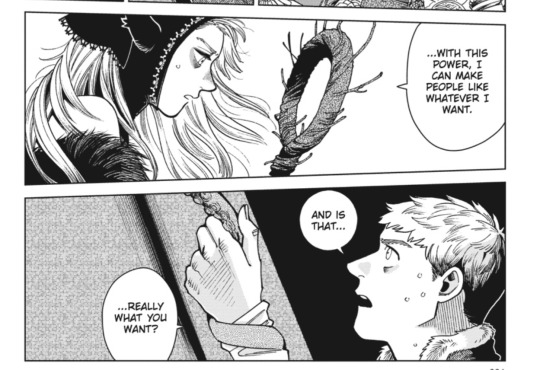
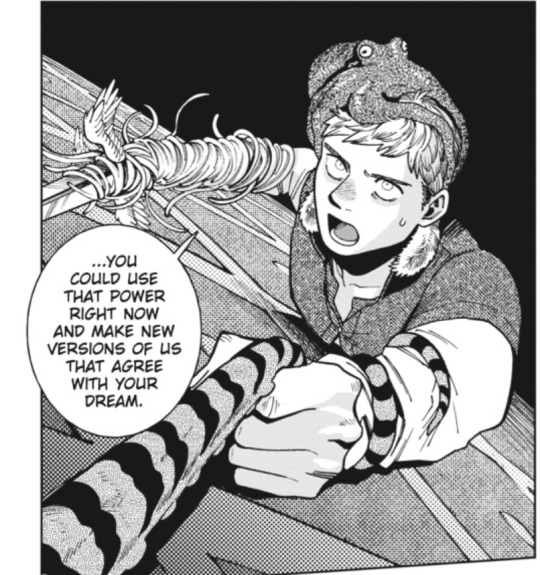

Disagreeing, coming into conflict, and misunderstanding each other, are essential parts of what it means to be living beings, as fundamental as the need to eat.
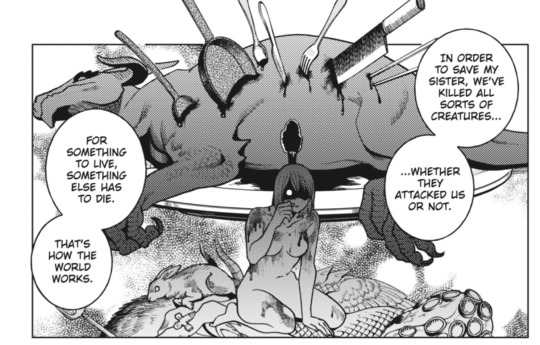
The only thing to do is not to take more than you need to eat to survive, and not impose your own desires onto others. To do your best to sincerely communicate your desires, even if they're embarrassing or vulnerable or strange, like Kabru eventually does with Laios; like Laios does, bit by bit, with the people around him; like Marcille does, Chilchuck does, Senshi does... to hope they will accept you, and do your best to understand them in return.
We can re-examine, in that context, Kabru's line about the elves' tendency to "explain nothing and take everything".
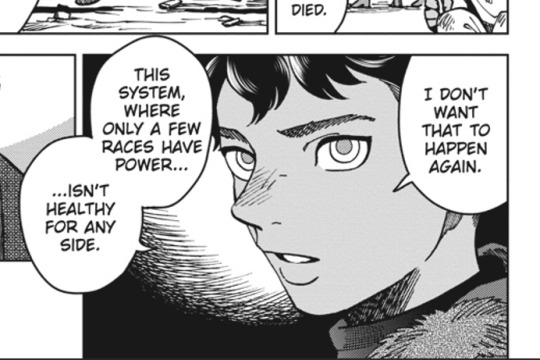
They have the power to impose their preferred "menu" onto less powerful groups. And in that context, mutual understanding being impossible just means that they won't give up their power because they're asked nicely. Kabru's goal is to seize the truth that they won't give to him, and to create a situation where they can't take everything. Because he's accurately surmised that nothing about the treatment of short-lived races will change so long as the power imbalance remains. Despite the way he mistakenly ascribes part of that to "long-lived vs short-lived" or "human vs demi-human", the actual gulfs in understanding he identifies are structural, are about power and about access to material resources and safety.
I think he could come to recognise this. Yaad is teaching him political science after all, and while a prince's lessons on political science won't exactly get at much that's radical or invested in the interests and perspectives of the marginalised (Capital is a critique of for a reason after all...) I believe in Kabru's ability to learn critically and get more from a lesson than it was intended to teach.
#og post#kabru of utaya#kabru dungeon meshi#laios touden#dungeon meshi meta#dungeon meshi#dunmeshi#dungeon meshi manga spoilers#dungeon meshi analysis#kuro dungeon meshi#the canaries#milsiril#continuing to develop my kabru theses.#literally sitting and thinking about kabru all day. rotating him.#he's in the microwave. to me.
393 notes
·
View notes
Text
Milsiril Anthem ✊️😔

276 notes
·
View notes
Text
Kabru from Dungeon Meshi's Ethnic origin

(Masterpost of evidence available here now!)
I've seen folks talking about this, which makes me SOOOOO happy. I've been trying to tell people that Kabru is *some kind* of fantasy version of Indian since at least March of 2023, which is when I finished reading what was available of Dungeon Meshi at the time. You may have seen my post in the Kabru tag about his name suggesting that he's of Nepali origin!
I'll go into this in a LOT more detail when I finally publish my big Dungeon Meshi research paper (soon, I promise, I hope), but this is such a wonderful win for Kabru fans that I wanted to make a post about it!
So many helpful fans were able to identify the sweet Kabru's trying to talk about is rasgulla, which means I didn't have to actually do any research to figure it out like I normally would have. Though since I know Kabru's meant to be from someplace like India, it wouldn't have been hard to search for "Indian dessert white ball" and figure it out.
Rasgulla (literally "syrup filled ball") is a dessert popular in the eastern part of South Asia. It is made from ball-shaped dumplings of chhena dough, cooked in light sugar syrup. This is done until the syrup permeates the dumplings.
While it is near-universally agreed upon that the dessert originated in the eastern Indian subcontinent, the exact locus of origin is disputed between locations such as West Bengal, Bangladesh, and Odisha.
The name rasgulla is derived from the words ras ("juice") and gulla ("ball"), and other names for the dish include rasagulla, rossogolla, roshogolla, rasagola, rasagolla, and rasbhari or rasbari.
Rasbari is the name of it in Nepal, so I think that's probably what Kabru would have called it if Milsiril hadn't interrupted him.
#kabru#dungeon meshi#delicious in dungeon#dunmeshi#also I don't think any of the elves are meant to be white but I'll get into that later when I'm ready to publish my research#(that doesn't make what Milsiril is doing to Kabru any less horrible though obviously)#theories#Dungeon Meshi Research
390 notes
·
View notes
Text
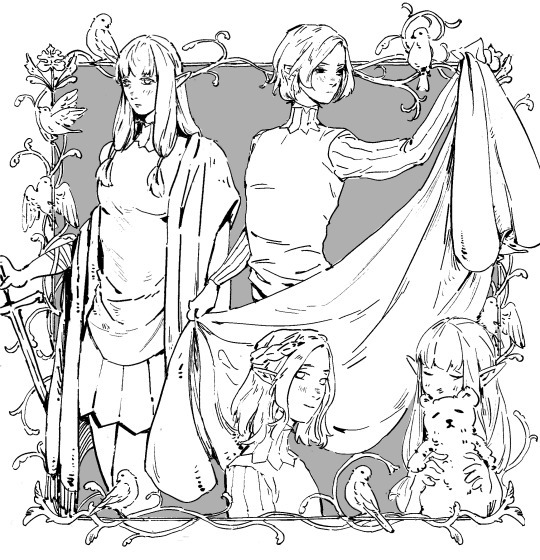
Two of my fav canaries (it actually goes Pattadol, Milsiril, and then Mithrun
237 notes
·
View notes
Text
I just noticed how mithrun being able to make new desires was foreshadowed because him wanting to kill the demon was a desire that surfaced after all of his desires were supposed to have been consumed so it makes sense he’d be able to create new ones later on as well
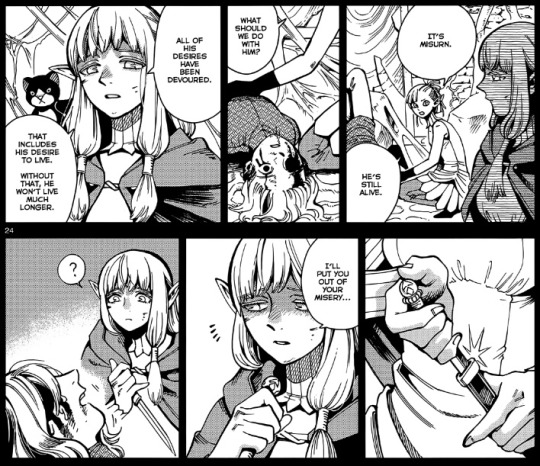
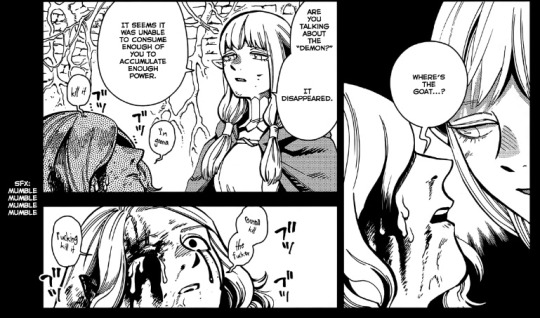
269 notes
·
View notes
Text
dungeoning my meshi rn :3
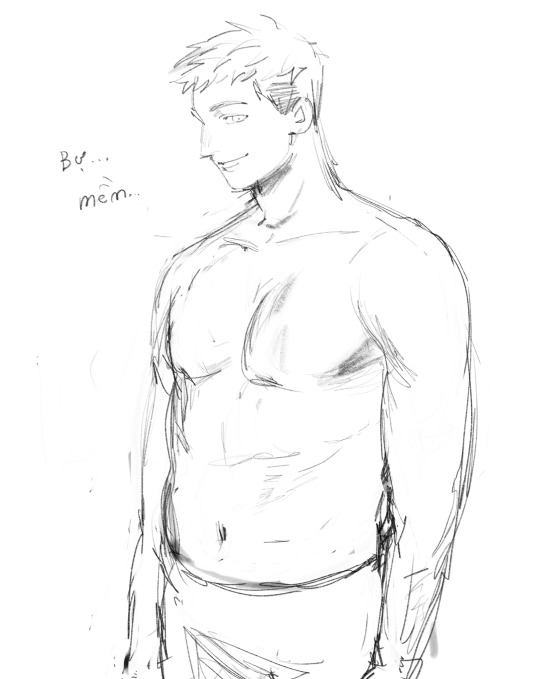
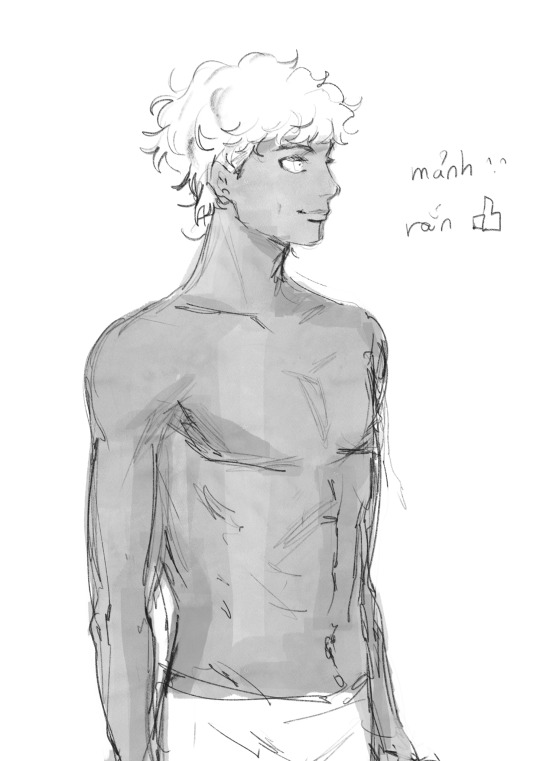

#fanart#delicious in dungeon#dungeon meshi#dunmeshi#my art#laios touden#kabru#mithrun#milsiril#doodle
213 notes
·
View notes
Text
GANG I AM SURE IT IS OLD NEWS BUT I HAVE BEEN DOING MATH AND LEMME TELL YOU A FUCKING THING
EXHIBIT A: MITHRUN’S TIMELINE PER THE DUNGEON GUIDE
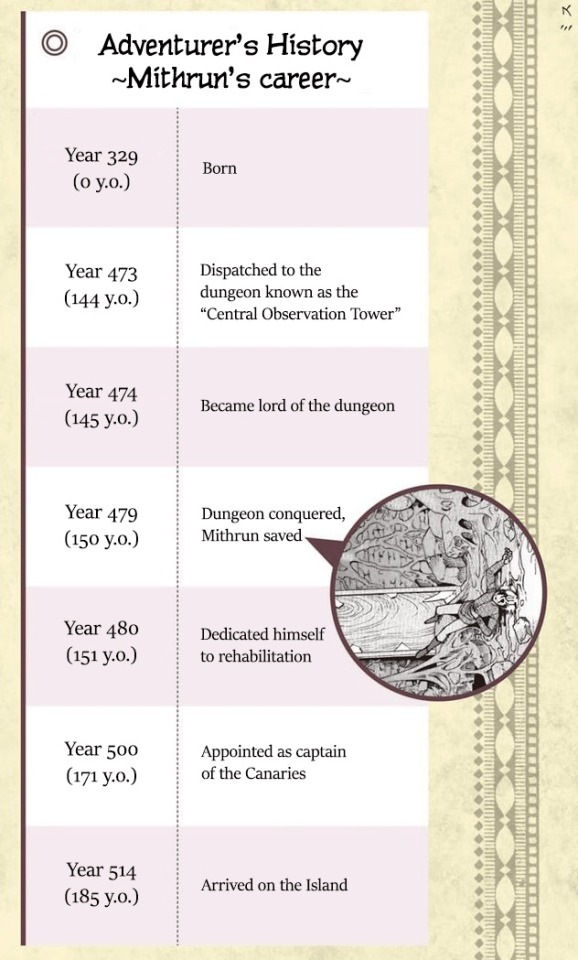
EXHIBIT B: KABRU’S TIMELINE PER THE DUNGEON GUIDE

EXHIBIT C: MILSIRIL’S COMIC PER THE DUNGEON GUIDE
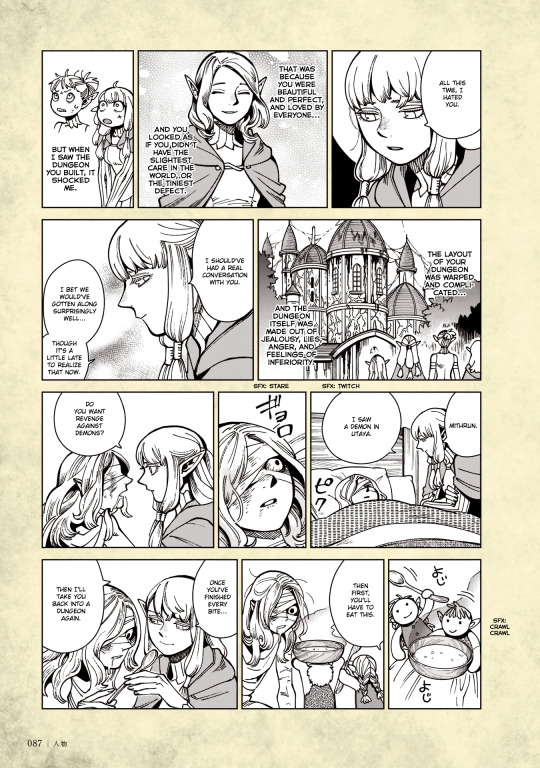
HYPOTHESIS: Milsiril was bare minimum visiting, caring for, and feeding Mithrun at points in his timeline between year 480 (trying to recover) and 500 (appointed as a captain - this is also noted to have happened immediately when he was fit for work, since they were running out of people)
In the comic, Milsiril specifically references Utaya (year 499, from Kabru’s timeline - it’s the only demon incident in Utaya), as she uses the incident with the demon in Utaya to get Mithrun to eat and get his act together
Kabru lived with Milsiril in the elven capital from year 499 to 510
Milsiril specifically dislikes and avoids other elves… now with the apparent exception of Mithrun, who she thinks she might have quite liked pre-nuking
Milsiril would not want to go to Mithrun’s family estate and deal with his entire family every time to take care of him… and they may not have been keen on her dolls or cooking
The only thing we know about Mithrun and his family is that he hated his brother, and visits him every five years (brother has extended a permanent invitation for Mithrun to visit any time pretty sure Mithrun overestimates how much his brother cared/noticed he didn’t like him)
His parents deadass aren’t mentioned except to note that he’s the bastard child, and his parents ignored his older brother. There’s an implication here that they preferred Mithrun… until they sent him to a death squad
Milsiril has a repeatedly-mentioned tendency to take in strays, usually kids of short-lived peoples, and strong nurturing instincts that may/may not be pretty dehumanizing
CONCLUSION: there is a non-zero chance that Mithrun and Kabru LIVED TOGETHER FOR A FUCKING YEAR post Utaya at Milsiril’s house and just didn’t even fucking notice
I am losing my mind
This is incredible
Mithrun deadass coulda been The Crazy Uncle In The Attic for a full fucking year
He was busy going feral and blaming himself for Utaya cuz it “could have been different” if he’d been there and recovered for the same fucking year THE LAST SURVIVOR OF UTAYA was in the next room
What kind of unhinged interactions did they have
Kabru was fucking SEVEN the state of Mithrun in that comic woulda fucking RETRAUMATIZED HIM any mention of him being a dungeon lord???? NOPE
We know from the changeling incident that Mithrun barely considered Kabru a distinct person so 0% chance he would ever put it together but KABRU
Kabru is an observant little thot and his favourite thing is making assumptions from his observations
Just a MENTION of Milsiril and Kabru shoulda been all up on that
Mithrun FULLY DID mention her as Milsiril the Gloomy when exposing his backstory and Kabru just… tossed every single name in the garbage
(Which, fair. Elves live a long time, the odds of there being only one Milsiril are 0% and she wasn’t all that gloomy with Kabru, and, frankly, he had bigger concerns named Laios Touden)
Ugh too much too many bits Otta’s comic includes them actually talking about his adoptive mom but without names they were SO CLOSE I am going insane
Fanfiction
So much fanfiction
It MUST be post Kabru/Mithrun this ship is all angst and tbh the whole “desiring someone who can’t desire” is only gonna consternate Kabru for so long so once that is done I want a slice of “WAIT A FUCKING SECOND you’re the guy in the attic???????”
#dungeon meshi#delicious in dungeon#dunmeshi#mithrun#mithrun dungeon meshi#kabru#kabru dungeon meshi#kabru/mithrun#but also LORE#milsiril#milsiril dungeon meshi#y’all have no idea i am eating this shit up
388 notes
·
View notes
Text
The more I think about Kabru and Milsiril the wilder it gets. Man literally watched his family ripped apart by the Horrors and then got adopted by a former spec ops white woman obsessed with Funko pops
211 notes
·
View notes
Text

Information on the structure of the Canaries, source from weibo. This is included in the new version of the Adventurer Bible.
(Click for details.)
Inspired by @room-surprise's partial break down of this page, I got it translated! Room also has a lot of good dunmeshi world building posts, so I definitely recommend checking out their blog!
Repost policy:
CN->ENG Translation + clean up is done by me!
This post is locked because the leaker prefers to not have her stuff reposted to other places to prevent spreading accidental misinformation/mistranslation, so this is only for casual reading before official translation comes out.
If you want to crop part of this post and use elsewhere please make sure to add the above addendum, or link back to this post instead.
Here's why I don't support Savaralyn's translations.
#ダンジョン飯#dungeon meshi#delicious in dungeon#dunmeshi leaks#dunmeshi spoilers#dunmeshi manga spoilers#translations#mithrun#flamela#lycion#fleki#pattadol#otta#cithis#milsiril#helki#misyl#erique#i think thats everyone named?#the canaries#i forgot i still had this in the backlog LOL#this goes out to the elf likers
354 notes
·
View notes

